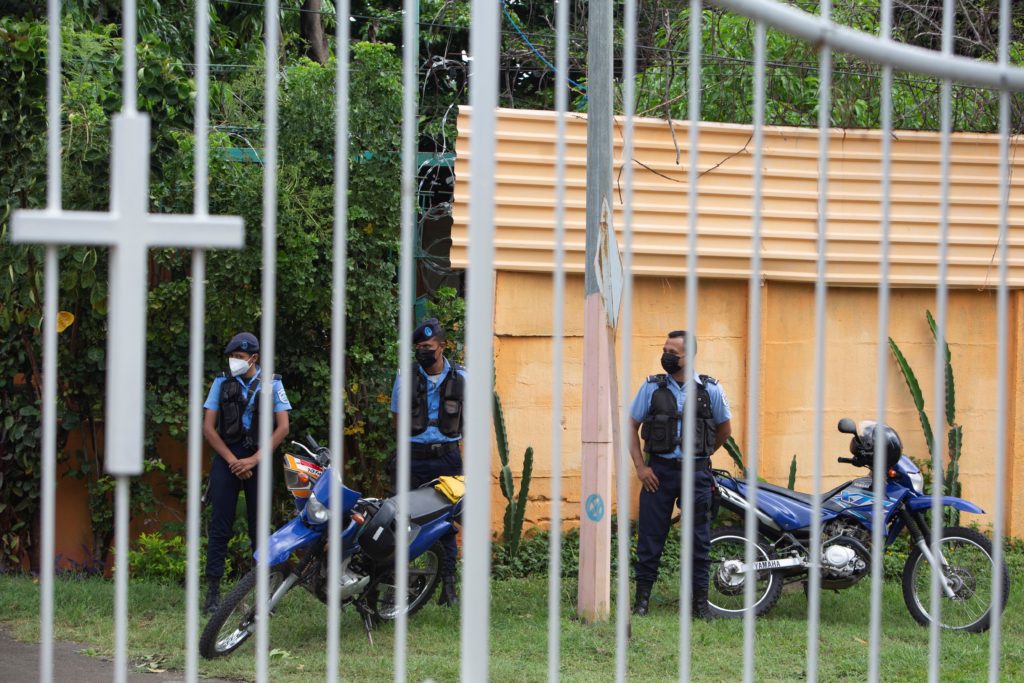Nicaraguan police burst into Matagalpa diocesan headquarters and removed an outspoken bishop who had been under house arrest for more than two weeks.
Police raided the curia in the predawn hours of Aug. 19 and took Bishop Rolando Álvarez, according to a social media statement from the Diocese of Matagalpa.
Nicaragua's National Police later confirmed that they carried out "an operation which permitted the recuperation of normalcy for Matagalpa's citizens and families."
Bishop Álvarez was being held under house arrest in the Nicaraguan capital, Managua, where he has received family and visited with Managua Cardinal Leopoldo Brenes.
The bishop had been holed up in the diocesan office for 16 days with 11 others as police maintained a constant presence outside. Sirens wailed and church bells tolled as he was taken away at 3:20 a.m.
The police statement said the others in the office were taken to Managua, while the curia was left to the diocesan vicar, Msgr. Oscar Escoto.
"As destabilizing and provocative activities persisted, the aforementioned public order operation was necessary," the statement said.
The bishop's arrest marked another escalation in the repression against the Catholic Church in the Central American country.
The National Police said in an Aug. 5 statement that the bishop was under investigation for "trying to organize violent groups, inciting them to execute acts of hate against the population, provoking an environment of chaos and disorder, disturbing the peace and harmony in the community with the objective of destabilizing the Nicaraguan state and attacking the constitutional authorities."
The investigation was revealed after Bishop Álvarez vociferously objected to regulators ordering the closure of Catholic radio stations in the Diocese of Matagalpa; parishioners had tried to impede police confiscating equipment.
During his house arrest, the bishop and companions had released a series of social media videos.
"We have to respond to hate with love, despair with hope, and fear with the strength and courage given to us by the glorious and resurrected Christ," the 55-year-old prelate said in one video posted on various social media platforms.
Nicaraguan President Daniel Ortega -- who has treated the Catholic Church as a political enemy -- has arrested priests, expelled the Missionaries of Charity and apostolic nuncio and closed Catholic media outlets and educational and charitable projects.
One priest, Father Oscar Benavides, was detained in the Diocese of Siuna while traveling to celebrate Mass Aug. 14 and has been imprisoned in the notorious El Chipote political prison in Managua, according to a source. Multiple news reports have documented the repressive conditions inside the prison.
"Here in Nicaragua it seems that to be a priest is a sin, is prohibited," the source said.
The same day Father Benavides was arrested, two other priests were prevented by police from attending a Marian celebration at the Matagalpa Cathedral.
Auxiliary Bishop Silvio José Baez of Managua, who was forced to leave Nicaragua in 2019 due to security concerns, tweeted about Bishop Álvarez: "May his kidnappers respect his dignity and release him! Once again, the dictatorship surpasses its evil and diabolical spirit."
The Ortega regime started cracking down on critics in 2018 after protests erupted and the people took to the streets demanding Ortega's ouster.
The Nicaraguan bishops' conference attempted to mediate a dialogue between the protesters and the government, but the process broke down due to a "lack of consensus," according to the bishops. Some parishes and priests, along with the Jesuit-run Central American University, provided refuge for student protesters being violently suppressed by police and paramilitaries.
In the United States, Aug. 19, Bishop David J. Malloy of Rockford, Illinois, chairman of the U.S. bishops' Committee on International Justice and Peace, expressed "our continued steadfast solidarity with our brothers in the Nicaraguan episcopate, along with their priests and foreign missionaries, in their calling to freely proclaim the Gospel and live the faith. The faith of the Nicaraguan people, who stand in solidarity with their bishops and priests, is an inspiration for us all."
He noted that in 2018, "Archbishop Timothy P. Broglio traveled to Nicaragua to express USCCB's solidarity with our brother bishops in that country. In his homily at the Cathedral of Managua he memorably said, 'I see the commitment of your bishops as a sign of God's love.' In the last few weeks, the Nicaraguan bishops have, once again, heroically demonstrated the enduring validity of that sentiment."

